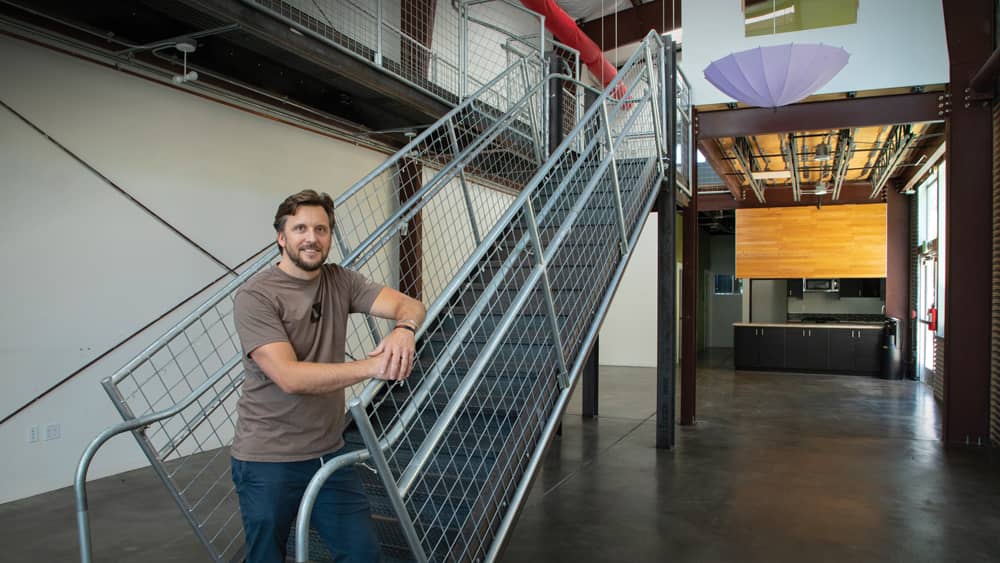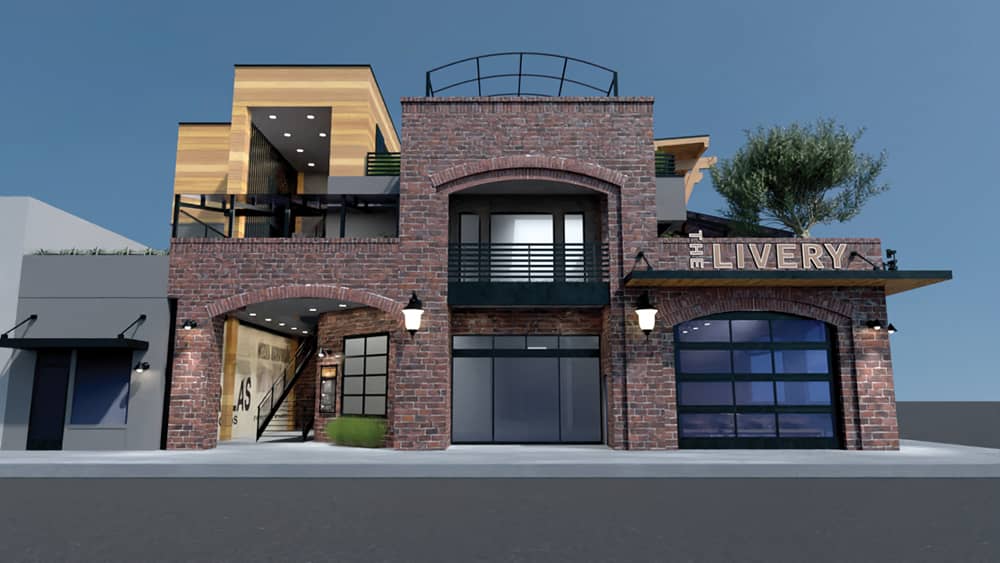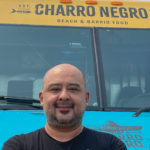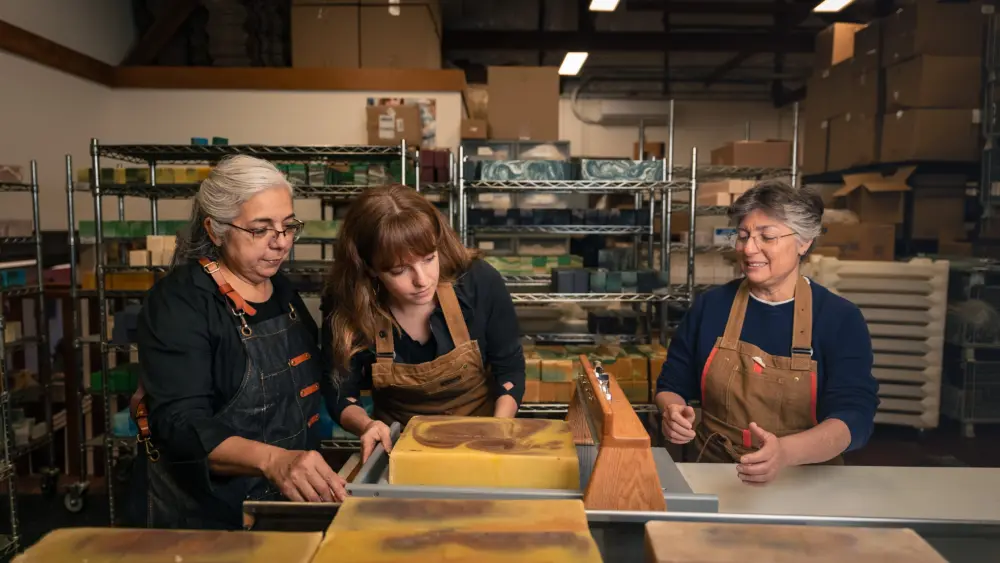
The long-vacant Roundtable Pizza building on Main Street in Sebastopol is about to get a major makeover. Over the years, the site has seen a number of transformations—from an 1890s livery, a hotel, a rabbit warren of offices, to a pizzeria. And now comes The Livery on Main, a food mall, a unique concept in dining, and a place for community gatherings. The 22,000-square-foot complex will be home to seven to eight chef licensees each offering diverse menus. There will be an indoor-outdoor dining area, a lounge for beer and wine, and entertainment venue and a space for co-working. The project is the brainchild of Sebastopol’s Greg Beale, CEO and founder of The Beale Group and his team of interconnected businesses—Thrive Construction Group (general contractor); Builders’ Studio of Sebastopol (architectural and engineering design firm); Farm to Coast Collective (Master tenant of the Livery project); and Beale Group Properties, owner of The Livery on Main building.
A food hall concept
“Running an independent restaurant is a tough business,” Beale says. “And the pandemic made things even tougher. The food hall concept eases the burden by requiring less staffing, less up-front investment and less operating cost. Chefs can focus on their passion—creating good food.” A recent Cushman & Wakefield study, “The Food Hall Model: Independent F&Bs Pathway to Post COVID-19 Profitability” confirms Beale’s comments and optimism. The report states that prior to the pandemic, food halls were the fastest growing trend in the food industry, and that trend should continue as the food industry rebuilds. The food hall model provides better economics. Relieved of the burden of overhead expenses such as utilities, marketing, POS systems and property tax, profit margins for food hall chef licensees are typically 15% to 20%, compared to an independent restaurant’s 10% profit.
Architecture
Grace Meeks of Builders’ Studio is the project’s lead architect. Meeks has more than 35 years of experience in designing buildings that blend with the surrounding community. “My dad was a contractor,” says Meeks. “I grew up around construction sites. It seemed natural that I would end up in the business.” Meek’s sister, Amanda Clare Brummé, is also a Builders’ Studio architect. The sisters along with engineer Kate Goede and Jenifer Klein, marketing and creative director, make up the in-house design team. “When we saw an 1890 photograph of the former site occupant, the Golden Rule Livery and Feed Store, we got excited,” Meeks says. “The livery concept became the brand, and provided an opportunity for us to incorporate tradition on the exterior, and modern concepts within,” adds Klein. “For the interior, we added the idea of a rooftop entertainment venue and co-work space.”
The team did design sketches, worked with the mechanical and structural engineers, and gathered input from neighboring restaurateurs and potential chef licensees. And they met with the Sebastopol Design Review Board to ensure exterior compliance.
The design includes roof openings that provide natural light throughout. And sustainability was an important consideration. There are solar panels, low-flow systems, drought-tolerant landscape and LED fixtures. Food delivery vehicles will be electric. A composting program will also be implemented with local farmers.
The design team, which includes the three architects, a creative director, structural engineer, electrical engineer, interior designer, and landscape architect, are all women. “I’m proud of that, though I take no credit,” Beale says. “That’s just the way it happened.”
Following a livery theme, Level 1 is dubbed The Stables and is home to the chef’s micro-kitchens and a vast shared dining area. Level 2, The Loft, provides co-working space for digital nomads and is home to Farrier’s, a speakeasy lounge serving beer, wine, spirits and a food menu. Level 3, The Rafters, will be a rooftop entertainment venue and can be used for private events.

Construction
Greg Beale, a licensed contractor with a bachelor of science in construction management, will oversee construction. During the search for a suitable site for The Livery, he and his team evaluated several potential properties. Their focus was on location and the extent of renovation required. “The Roundtable Pizza building offered the best opportunity for what we wanted to do,” he says. “It’s located downtown, the structure’s solid and the interior offers flexibility. An added benefit turned out to be Burnett, the cross street. “It can be blocked off for outdoor events catered by The Livery and neighborhood chefs.”
Beale states that in some regards it would have been easier to demolish the building and start from scratch. “But we didn’t want to do that,” he says. “Our motto is to respect the past and build the future. We didn’t want to add to a landfill when the building could be reimagined.”
The site has ample access to public service with multiple gases and electric meters available. Throughout there’s a fire sprinkler system that can be reconfigured to fit The Livery design. Excavation will be undertaken to accommodate an elevator and a grease sump for kitchens. And the redbrick columns and stucco façade will be replaced with more traditional brick.
Beale Group Properties obtained a permit a year ago for non-structural gutting and prep work. “This allowed us to go in and remove low ceilings, so designers could better envision the space, and enabled us to do exploratory work,” Beale says.
“As Thrive has a two-year-plus backlog of projects, we will be using local subs for everything except carpentry. That will be done by our own staff.
When the adjoining Persinger Building on Burnett Street became available in August, Beale Group Properties acquired the site. “This gives us an additional 3,000-square-feet and the potential to add more chef licensees. For now, we call it ‘The Little Livery,’ Beale says. The building requires little in the way of renovation. “It’s possible that chef licensees might use the space now, while the larger building is under construction. When construction is complete, the common wall will be opened tying the buildings together.”
Chef Licensees
“We wanted a mix of cuisines that would not compete with each other,” says Becca Lipinski, chief operating officer of The Beale Group. “We wanted to offer international flavors, comfort food, fresh seafood, kid-friendly, gluten-free and vegan. We sought chefs offering a small menu of creative options.”
F2CC’s licensing agreement provides for shared services to include: marketing, bookkeeping, POS, internet and phone, bussing and cleaning, music, security, seasonal events/decorating and local delivery service.
Public Benefit Corporation
Farm to Coast Collective (F2CC) is a public benefit corporation (PBC). A PBC incorporates a traditional for-profit model with a focus on the social, economic and environmental needs of a community. F2CC’s charter includes a commitment to socially and economically empower small businesses. Their goal is to create community-gathering spaces that support local farmers, chefs, artists, performers and makers. They aim to support entrepreneurs by creating a go-to, comfortable, versatile space for business and community in the heart of downtown. The development strives to preserve the building’s unique history and stay consistent with Sebastopol’s distinctive character. The Livery on Main is F2CC’s first project.
Crowdfunding
Farm to Coast Collective (F2CC) joined Wefunder in crowdfunding to raise monies that will directly benefit seven to eight talented local chefs as they start up or expand. In 2016, Regulation Crowdfunding legislation made it possible for the public to invest small amounts in entrepreneurial ventures they believed in. Wefunder, a public benefit corporation, has raised more than $300 million for start-up businesses ranging from coffee shops and bookstores to supersonic airplanes. The minimum amount required for investment is $100. The F2CC offering memorandum is available at wefunder.com/farm.to.coast.
The Beale Group took an underutilized, long-vacant site in Sebastopol and is converting the space, and an adjacent property, into a unique concept in dining, and a place for community gathering. The remodel pays tribute to Sebastopol’s agrarian roots and sense of community. When finished, the complex will showcase menus of local chefs, and revitalize downtown. The grand opening of The Livery on Main is slated to take place in autumn of 2022.
Meet the Chef licensees
Following are five chef licensees and their stories.
 Charro Negro. Chef Rodrigo Mendoza hails from Bolivia. “My grandfather was the cook in our family. He inspired me,” says Mendoza. He received his formal culinary training at “L’Academie de Cuisine” in Washington, D.C. followed by stints at restaurants on both coasts. More recently he was chef de cuisine at the popular Willi’s Seafood & Raw Bar in Healdsburg, where he worked for 10 years. “When Willi’s closed because of the pandemic, I got laid off,” he says. “After 2 to 3 months, I was worried. So when a food truck at the Mitote Food Truck Park in Santa Rosa became available, I bought it.” His food truck specializes in mariscos, or fresh seafood prepared Mexican-style. “I’m excited to be part of The Livery,” Mendoza says. “I like the concept. It’s similar to a food truck park—a place with different foods, a place to gather and have fun.”
Charro Negro. Chef Rodrigo Mendoza hails from Bolivia. “My grandfather was the cook in our family. He inspired me,” says Mendoza. He received his formal culinary training at “L’Academie de Cuisine” in Washington, D.C. followed by stints at restaurants on both coasts. More recently he was chef de cuisine at the popular Willi’s Seafood & Raw Bar in Healdsburg, where he worked for 10 years. “When Willi’s closed because of the pandemic, I got laid off,” he says. “After 2 to 3 months, I was worried. So when a food truck at the Mitote Food Truck Park in Santa Rosa became available, I bought it.” His food truck specializes in mariscos, or fresh seafood prepared Mexican-style. “I’m excited to be part of The Livery,” Mendoza says. “I like the concept. It’s similar to a food truck park—a place with different foods, a place to gather and have fun.”
 Village Bakery. The husband and wife team Patrick Lum and Teresa Gentile, operate the Village Bakery in Santa Rosa’s Montgomery Village. Lum focuses on products, Gentile on retail sales, marketing and social media. He grew up in Sebastopol where his mother cooked and the kids pitched in. Lum attended the renowned California Culinary Academy and following graduation worked at several Bay Area restaurants and bakeries. In 2019, the couple opened a production facility and retail shop in Sebastopol’s The Barlow. And then came a flood that swamped their business. They lost everything. The disaster had personal ramifications as well. Gentile suffered stress-induced cardiomyopathy, commonly known as broken heart syndrome. She spent two weeks in the ICU and was bedridden for 6 months. “I’m okay now,’ she says, “Though the doctor advised me to take it easy.” Following the flood, Village Bakery was forced to lay off 60 employees. And without a production facility, they were unable to service their 200 commercial accounts.
Village Bakery. The husband and wife team Patrick Lum and Teresa Gentile, operate the Village Bakery in Santa Rosa’s Montgomery Village. Lum focuses on products, Gentile on retail sales, marketing and social media. He grew up in Sebastopol where his mother cooked and the kids pitched in. Lum attended the renowned California Culinary Academy and following graduation worked at several Bay Area restaurants and bakeries. In 2019, the couple opened a production facility and retail shop in Sebastopol’s The Barlow. And then came a flood that swamped their business. They lost everything. The disaster had personal ramifications as well. Gentile suffered stress-induced cardiomyopathy, commonly known as broken heart syndrome. She spent two weeks in the ICU and was bedridden for 6 months. “I’m okay now,’ she says, “Though the doctor advised me to take it easy.” Following the flood, Village Bakery was forced to lay off 60 employees. And without a production facility, they were unable to service their 200 commercial accounts.
Ten months later, Lum and Gentile rented Santa Rosa’s Westwind Bakery and again began producing their award-winning seeded sourdough bread and other fine pastries for the new Montgomery Village site where they also have ovens for gluten-free products. Village Bakery bread can be found at Oliver’s, Safeway, Whole Foods and other markets. Lum and Gentile have faced multiple business disruptions—the flood, wildfires and the pandemic. Ever resilient, they remain upbeat and optimistic. “Returning to Sebastopol will be a homecoming for us,” Lum says. “We look forward to working with the other Livery chefs and serving the community.”
 Lunchbox. Megan and Derek Harn love burgers. When they couldn’t quite find what they were looking for, they created their own. Derek previously worked in the food and beverage industry in Portland, Ore., and Megan has a background in social media and marketing. They combined skills and formed LunchBox, initially focusing on burgers. “Our burgers are made with meat from Stemple Creek Ranch in Marin. They’re half-brisket, half-chuck,” Megan says. “And we make our own cheese,” Derek adds. “Melts like American tastes like Cheddar.” During the pandemic downtime, the couple created a sandwich menu, which includes a Ruben, Cubano, Fried Chicken and BLT. They offer their fare at area pop-up events. “We look forward to being part of The Livery team, working with other chefs to support each other,” Megan says.
Lunchbox. Megan and Derek Harn love burgers. When they couldn’t quite find what they were looking for, they created their own. Derek previously worked in the food and beverage industry in Portland, Ore., and Megan has a background in social media and marketing. They combined skills and formed LunchBox, initially focusing on burgers. “Our burgers are made with meat from Stemple Creek Ranch in Marin. They’re half-brisket, half-chuck,” Megan says. “And we make our own cheese,” Derek adds. “Melts like American tastes like Cheddar.” During the pandemic downtime, the couple created a sandwich menu, which includes a Ruben, Cubano, Fried Chicken and BLT. They offer their fare at area pop-up events. “We look forward to being part of The Livery team, working with other chefs to support each other,” Megan says.
 Cozy Plum. Good friends Charles White and Lisa Le Donne are co-owners of Santa Rosa’s Cozy Plum Bistro, a plant-based vegan eatery on Mendocino Avenue. “Our timing to open restaurant couldn’t have been worse,” White says. “We opened after a seven-month escrow and then had three days of normal operations before the shelter-in-place took effect and forced us to pivot even further into unknown areas.” With customers seeking home delivery, Cozy Plum linked up with DoorDash and Grubhub, though the service takes 30% off the top on orders. “Then a miracle happened,” White says. “Customers found us, started leaving great reviews and kept coming back. I’m thinking our good food helped, but perhaps it’s also because we stand for things that matter, like minimizing the carbon footprint, minimizing animal cruelty and promoting good health.” White developed Cozy Plum’s menu. “I made what I liked thinking others would like it too. Our 350-square-foot kitchen at The Livery is larger than the one in Santa Rosa. So we’ll have no problem in offering a full vegan menu,” says White. Cozy Plum restaurant ratings have consistently been 4.6 to 4.7.
Cozy Plum. Good friends Charles White and Lisa Le Donne are co-owners of Santa Rosa’s Cozy Plum Bistro, a plant-based vegan eatery on Mendocino Avenue. “Our timing to open restaurant couldn’t have been worse,” White says. “We opened after a seven-month escrow and then had three days of normal operations before the shelter-in-place took effect and forced us to pivot even further into unknown areas.” With customers seeking home delivery, Cozy Plum linked up with DoorDash and Grubhub, though the service takes 30% off the top on orders. “Then a miracle happened,” White says. “Customers found us, started leaving great reviews and kept coming back. I’m thinking our good food helped, but perhaps it’s also because we stand for things that matter, like minimizing the carbon footprint, minimizing animal cruelty and promoting good health.” White developed Cozy Plum’s menu. “I made what I liked thinking others would like it too. Our 350-square-foot kitchen at The Livery is larger than the one in Santa Rosa. So we’ll have no problem in offering a full vegan menu,” says White. Cozy Plum restaurant ratings have consistently been 4.6 to 4.7.
With White running the kitchen, Le Donne handles, first and foremost, the books, the scheduling, and most of the front of house management—and often her most enjoyable role as a chief taster. “My other job is trying to temper Charles’ vision and creativity,” she says with a laugh. In addition to her work at the restaurant, Le Donne teaches eighth grade and is a union negotiator for the Oak Grove Union School District. “Lisa is the best partner I could’ve ever hoped for. She’s everything I’m not. Cozy Plum wouldn’t exist without her.”
White and Le Donne grew up in Sebastopol. They attended the same high school though didn’t know each other then. They reconnected on Facebook in 2017 when Lisa was in the hospital with a serious illness. White brought her a homemade vegan BLTA and the friendship bloomed immediately. “The Livery is the perfect next step for us. We’ll be part of a collaborative business model and joining a team of experienced professionals,” Le Donne says. “My ties to Sebastopol run deep. My parents still live in the house where I grew up. I feel like we’ve been invited home.”
 Taverna Lithi. Lithi is a Greek fishing village on the island of Chios in the Mediterranean. It’s where Chef Dino Moniodis was raised. “Seven generations of my family grew up in Lithi,” he says. “The food is as good as the view. Working in tavernas gave me an appreciation for what goes into making good healthy food.” In Greece, it’s traditional to sit by the beach and order meze, or small plates of savory snacks. Meze will be the focus of Tavern Lithi’s menu at The Livery. It will include a Greek salad, dip platter with tzatziki, a tasty yogurt and cucumber sauce, hummus, skorthalia, a Greek garlic mashed potato dip, and kalamata olives, all served with fresh-made pita bread. Weekly the taverna plans to serve grilled whole fresh fish from Bodega Bay. Moniodis and life, business partner Sarah Kenney, operates Zimi Pizza in Petaluma, and the recently opened Zimi’s in Rincon Valley. Kenney takes care of operations, while Moniodis works his magic in the kitchen. “We are very excited about being involved with The Livery. I like that they handle the back office, allowing me time to create fresh, seasonal items for the menu, Moniodis says. “And their communal approach is something we’ve wanted to do since we operated a food truck. We look for ways to get involved with the community, and hope there might be an opportunity to round out our cultural experience with live Greek music at The Livery’s entertainment venue.”
Taverna Lithi. Lithi is a Greek fishing village on the island of Chios in the Mediterranean. It’s where Chef Dino Moniodis was raised. “Seven generations of my family grew up in Lithi,” he says. “The food is as good as the view. Working in tavernas gave me an appreciation for what goes into making good healthy food.” In Greece, it’s traditional to sit by the beach and order meze, or small plates of savory snacks. Meze will be the focus of Tavern Lithi’s menu at The Livery. It will include a Greek salad, dip platter with tzatziki, a tasty yogurt and cucumber sauce, hummus, skorthalia, a Greek garlic mashed potato dip, and kalamata olives, all served with fresh-made pita bread. Weekly the taverna plans to serve grilled whole fresh fish from Bodega Bay. Moniodis and life, business partner Sarah Kenney, operates Zimi Pizza in Petaluma, and the recently opened Zimi’s in Rincon Valley. Kenney takes care of operations, while Moniodis works his magic in the kitchen. “We are very excited about being involved with The Livery. I like that they handle the back office, allowing me time to create fresh, seasonal items for the menu, Moniodis says. “And their communal approach is something we’ve wanted to do since we operated a food truck. We look for ways to get involved with the community, and hope there might be an opportunity to round out our cultural experience with live Greek music at The Livery’s entertainment venue.”




